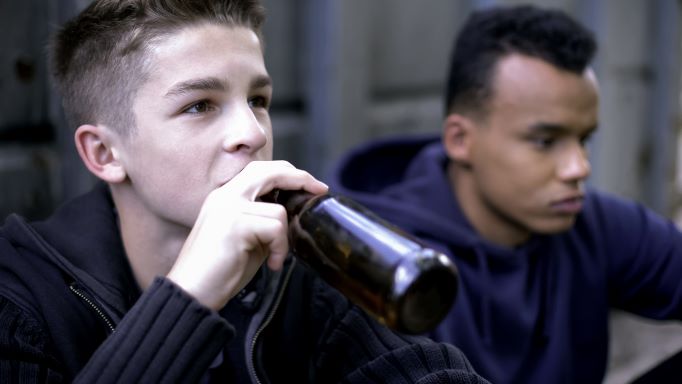Inside this post: Drinking and driving is no joke, and hopefully receiving an underage DUI can be the wake-up call your teenager needs to understand the seriousness of the matter, but beyond that, there are some important legal considerations that need to be addressed.

Many teenagers cannot wrap their heads around how serious the dangers of drinking and driving.
They’re at an age where they’re more than willing to take risks, try new things, or succumb to peer pressure. Despite repeated warnings, some adolescents will get behind the wheel of a vehicle after consuming alcohol.
Teens ages 16-19 already have the highest incidence of vehicle incidents. Mix in alcohol and you can have a lethal combination.
The good news is underage drinking and driving has decreased significantly over the last two decades. Even with this reduction, high school teens are estimated to drink and drive more than 2 million times a month. What’s more, teenage drunk drivers are responsible for 17 percent of fatal alcohol-related crashes. This is even though only 10 percent of licensed drivers are under 21.
In addition to the grave dangers of drinking and driving, an underage DUI can have long-term legal and financial ramifications. The courts are tougher on DUI offenders under the age of 21 and often subject them to more stringent DUI laws than those who are of legal drinking age.
If your teenager is arrested for drinking and driving, they can face serious legal consequences. This does not mean nothing can be done, though. Depending on the results of your child’s online DUI screenings, there may be ways to reduce or dismiss the charges.
The Best Way to Deal With an Underage DUI Is Not to Get One
While some teens will always feel invincible, there are ways parents can help reduce the risk of your teen drivers drinking and driving. These include:
Talk early and often. Conversations about alcohol should start when your kids are young and continue as they get older. Many adolescents are unaware of the impact alcohol can have on their health and developing brain,
Modeling appropriate behavior. No matter how our teenagers treat us, parents will always be their greatest role models. Parents need to set an example by not drinking too excess at home and having a designated driver plan when going out. Consumption of alcohol is a responsibility that needs to be consistently addressed in your family.
Sign a contract. No one wants to nag their kid all the time, so take the emotion out of it and have them sign a parent-teen driving contract.
Develop an emergency exit plan. Reducing drunk driving incidents often comes down to reluctant passengers. Be a safe space for your teen by instituting a no-questions-asked policy if they need a ride from somewhere or create a code they can send you if they are in an uncomfortable place. If your teen is away, set them up with a ride-share app (just make sure they know the safety rules for using these.)
Underage Drunk Driving Laws
A state’s underage DUI laws apply to drivers 21 years of age and below who are arrested for driving under the influence. If the breathalyzer test shows that the minor has a blood alcohol content (BAC) of over 0.02 percent, the offender may be arrested even without proof of actual impairment.
All states have zero-tolerance laws, which means that anybody under the age of 21 is not allowed to drive with any trace or measurable amount of alcohol in their system, usually ranging from 0.00 to 0.02 percent BAC depending on the state. The intent of these laws is to combat the dangers of underage drinking.
Possible Penalties for Underage DUI
DUI laws can vary by state, thus, the punishments for underage DUI depend on where your teenager received the citation. It is important to underscore, however, that getting arrested for drunk driving as a teen is a criminal offense. In most states, teens under the age of 18 are often charged as an adult, and the conviction will stay on their record. This could impact college admissions, military recruitment, and future employment.
While underage drinking is often a misdemeanor, underage DUI can be a misdemeanor or a felony depending upon the situation and state.
A first offense underage DUI conviction will often result in one or more of the following DUI penalties:
- Driver’s license suspension
- Jail time or time in a juvenile facility
- Revocation of license and loss of driving privileges
- Mandatory substance abuse treatment or alcohol education program
- Driver safety course
- Community service
- Probation
- Ignition Interlock Device (IID) installation
If the offender has prior DUI violations, the sanctions may also increase as determined by the state laws and other specifics of the case.
How to Deal with Underage DUI
As a parent, it’s natural to want to help your child through this challenging and frustrating situation. But what can you do if your teenager is arrested for underage DUI?
As in most situations involving teenagers, being proactive is the key. These tips will help reduce the risk of another drunk driving incident and lessen the negative impacts of an underage DUI charge.
1. Get a grip on your emotions.
Any parent would get furious after finding out their teenager is arrested for DUI. You may also feel guilty, ashamed, and hold yourself responsible. But while it’s important to express how you feel about the incident, you also need to remain calm to address the situation at hand.
Chances are your teenager is terrified after getting handcuffed and brought to the police station.
That being said, let your child know how you feel about their actions in a way that does not humiliate them or inflict more emotional harm. You’ll want to help your child make better decisions in the future and keep the communication lines between you open; not stir feelings of resentment and alienation.
2. Talk to them about the incident.
Engage your child in a calm, open conversation and speak to them from a place of love. Try to find out why they’re drinking in the first place and if they have any motivations for doing so.
Ensure they know that alcohol is no way to cope with stress or problems; it might even make them feel more depressed. Most importantly, they need to understand that an underage DUI conviction can have long-term implications that may get in the way of their educational and employment opportunities and cause them financial hardships.
3. Impose consequences for drinking and driving.
There is no one way to correct wrongdoing. Every child is different, but as a parent, you should already know what disciplinary measures your child responds to.
Lack of privileges, being grounded, no access to a phone or computer – these are just some of the punishments you can impose to make your living-at-home teenager realize the gravity of their mistake. For teens living out of the house, paying for any financial hardships is a must. They have to realize that they’ve disappointed you and broke your trust, and it will take time to earn it back.
4. Work with an experienced DUI lawyer.
One of the best things you can do for your child is to get a reputable DUI attorney to handle their case. The ultimate goal is to keep your child’s record clean of any DUI-related offense – as if it never happened.
At the very least, a good attorney can have the charges reduced or help you expunge the crime so it doesn’t show up in background checks and not drastically affect his or her life going forward. One mistake doesn’t have to ruin your child’s future.
Parenting teens and tweens is HARD. Make it a little easier with these popular posts other parents found helpful:
5 Essential Parenting Books Every Parent Of A Teenager Needs To Survive
This is Sixteen; When Everything Changes
How To Meet Our Teens; Need To Love and Be Loved Just As They Are
5 Simple Things You Need To Keep Doing When Kids Are Teens
This is a contributed post by Lauren Kunis. Lauren Kunis is the Content Marketing Strategist for Stonewall Institute, an outpatient alcohol and drug treatment center in Phoenix, Arizona that offers online DUI classes, DUI screenings, and a holistic, individualized approach to addiction recovery. She loves reading books, traveling, and going on hiking adventures with her dog, Max.






Leave a Comment